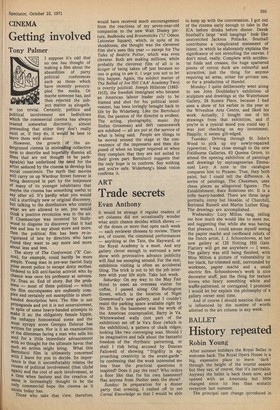CINEMA
Getting involved
Tony Palmer
I suppose it's odd that no one has thought of making a film about the absurdities of party political conferences such as those which have recently preoccupied the media. Or maybe someone has, and then rejected the subject matter as altogether too trivial. Certainly, politics and political involvement are bedfellows Which the ,commercial cinema has always treated somewhat discreetly, almost Pretending that either they don't really exist or, if they do, it would be best to leave them well alone.
However, the growth of the underground cinema (a misleading collective term to describe and hopefully dismiss all films that are not thought to be packageable) has underlined the need for the artist seduced by the cinema to develop his social conscience. The myth that movies Will carry on up Wardour Street forever is being destroyed in part by the insistence Of many of its younger inhabitants that Maybe the cinema has something useful to say after all. It's tiardly what you would call a startlingly new or original discovery, but talking to the distributors who control What we are allowed to see, you would think a positive revolution was in the air. If Cinemascope was invented by HollyWOod to disguise its discovery that it had less and less to say about more and more, then the political film has been re-invigorated of late by directors who have found they want to say more and more about less and less.
The story of The Conformist ('X' Cur49n), for example, could hardly be more Simple. Young man in pre-war fascist Italy Jams secret police to escape dotty mother. Ordered to kill anti-fascist activist who by Chance was once his professor at university. Does so. End of story. But the problems — most of them political — which the film encompasses are endlessly complex and certainly not susceptible to shorthanded description here. The film is not Propaganda and yet it is not entertainment, in spite of some heavy-handed attempts to flake it so: the obligatory female hippie, the unhappy homosexual scene and the most syrupy score Georges Delerue has written for years. Nor is it an examination Of the dilemmas facing a man who sells his sOul for a little immediate advancement With no thought for the ultimate havoc that such an action might bring. What this Se.rtolucci film is ultimately concerned With I leave for you to decide. Its importance is that it uncomfortably relates the causes of political involvement (that cliché again) and the cost of such involvement, at a time when fantasy and the creation of same is increasingly thought to be the Only commercial hope the cinema as it exists today has. Those who take that view, therefore, would have received much encouragement from the reactions of my seven-year-old companion to the new Walt Disney picture, Bedknobs and Broomsticks ('U' Odeon Leicester Square), which, in spite of its shoddiness, she thought was the cleverest film she's seen this year — except for The Tales of Beatrix Potter, which was even cleverer. Both are making millions, while probably the cleverest film of all is in danger of being taken off just because no one is going to see it. I urge you not to let this happen. Again, the subject matter of The Ballad of Joe Hill ('AA' Academy Two) is overtly political. Joseph Hillstom (18821915), the Swedish immigrant who became an American labour leader only to be framed and shot for his political involvement, has been lovingly brought back to life by Bo Widerberg. Like the Bertolucci film, the passion of the director is evident. The acting, photography, music (by Stefan Grossman) and deft camerawork are subdued — all are put at the service of what is being said. People are things to be moved around the stage at the convenience of the impresario and then disposed of when no longer required or when they complain that they are not suited to their given part. Bertolucci suggests that the only hope is to conform. Say nothing and you're safe. Widerberg's bleak vision confirms it.


































 Previous page
Previous page